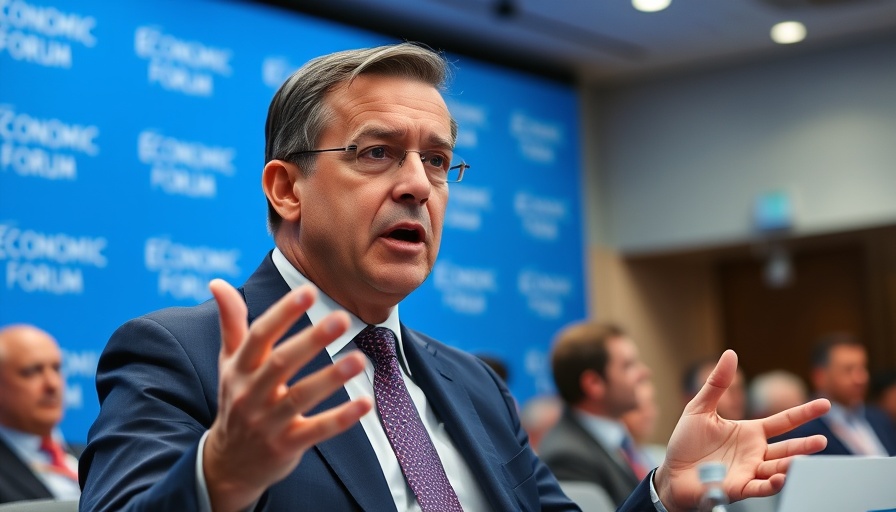
The Brink of Recession: Russia’s Economic Crisis Unfolds
As the landscape of global geopolitics continues to evolve, Russia finds itself at a precarious economic crossroad. Economy Minister Maxim Reshetnikov has recently issued a stark warning, indicating that the Russian economy teeters on the brink of recession—a view steeped in concern as the country grapples with ongoing pressures stemming from internal policies and external sanctions.
Understanding the Current Economic Landscape
During his address at the St. Petersburg International Economic Forum, often dubbed as “the Russian Davos,” Reshetnikov underscored the critical nature of Russia’s economic health. He urged the central bank to reassess its monetary policy, particularly its current interest rate, which stands at a staggering 20%. That rate, he argued, is acting as a significant barrier to economic recovery and growth, despite its intended purpose of curbing inflation, particularly as the Kremlin prioritizes military expenditures linked to the ongoing war in Ukraine.
This economic tightening comes in light of widespread complaints from businesses about the lack of capital availability, linking back to the elevated borrowing costs that have deterred investments. “If we wish to avoid a recession,” Reshetnikov stated, “there is an urgent need for measures that stimulate growth rather than stifle it.” The move to cut interest rates—albeit the first reduction since 2022—signals an awareness of the challenges ahead, though market response remains cautious amid continued instability.
The Impact of International Sanctions
The backdrop of heightened military spending and international sanctions only complicates matters for Russia. Following its invasion of Ukraine, Western nations have imposed stringent economic sanctions aimed at crippling Russia's financial capacity. These measures have not only affected the economy but have also drained the public's confidence and curtailed consumer spending.
The need for economic reform is underscored by the urgency conveyed by Reshetnikov, who reflected on the chilling data streaming from a variety of economic indicators; “It’s evident from the current feelings of businesses that we are already, it seems, on the verge of going into recession.” The stark reality is that while recession isn’t an absolute certainty, the potential indicators—rising inflation and a constricted credit market—paint a vivid picture of the challenges ahead.
Future Predictions and Economic Trends
As the situation evolves, analysts warn that the next few months will be critical for Russia. Changes in domestic policy can make or break the ability of the economy to recover from its current woes. Predictions suggest that if monetary constraints are not relaxed and the economy isn't diversified away from military reliance, the country could indeed slip into recession. The focus should shift towards creating an environment where businesses can flourish without being stifled by high-interest rates.
Looking forward, policymakers must grasp the importance of stabilizing the economy—not just for the sake of immediate recovery but to set a foundation for a sustainable future. The ripple effects of poor economic health extend beyond borders, potentially impacting global markets and alliances.
Counterarguments: Optimism Amidst Challenges
Despite the tremors of economic uncertainty, there are voices within Russia advocating for a more optimistic outlook. Some claim that Russia's vast natural resource wealth and internal market can create avenues for recovery. They point to robust resilience in certain sectors, indicating that with the right strategies, the economy could adapt to face external pressures effectively.
This perspective, however, requires a delicate balance—an approach that embraces liberal economic reforms while managing external relationships. Engaging more deeply with non-Western countries for trade could potentially mitigate some of the negative impacts caused by sanctions.
Conclusion: A Call for Insightful Action
As Russia navigates through an uncertain economic landscape, it is clear that immediate strategies and proactive decision-making are crucial. Now, more than ever, the nation must leverage its strengths while addressing weaknesses comprehensively. Tracking these developments is imperative, especially for global observers and investors interested in the stability of the broader European economy.
The call to action for policymakers within Russia is loud and clear: transformative measures are necessary to bring about economic resilience. A proactive approach can steer the country away from the looming threat of recession, setting the stage for healthier economic practices moving forward.
 Add Row
Add Row  Add
Add 




Write A Comment